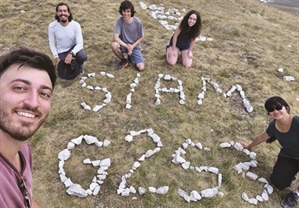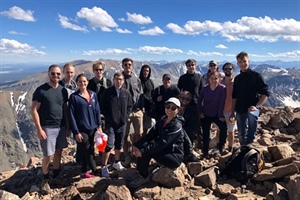Call for Proposals: 2026 Gene Golub SIAM Summer School
SIAM is calling for letters of intent (LOI) proposing topics and organizers for the 2026 Gene Golub SIAM Summer School (G2S3). The proposed two-week school for about 40 graduate students is to be held May-August 2026. LOI in all areas of applied and computational mathematics will be considered. SIAM will contribute up to $180,000 toward the operation of the 2026 program.
LOI should be sent to Richard Moore, moore@siam.org, preferably in PDF format, no later than January 31, 2025. The G2S3 Committee will invite a small number of those who submitted LOIs to submit full proposals. Have questions or want to discuss an idea? Please don’t hesitate to contact Richard!
Courses in the G2S3 are expected to be at the research level, have some computational component, and cover topics not usually found in regular university courses. The G2S3 should have an overall theme of current interest, with lectures and exercises or project sessions on complementary topics for this area.
Learn more about the G2S3 program, including past schools and the composition of the G2S3 Committee.

Funding
SIAM will contribute up to $180,000 toward the 2026 G2S3. Most of these funds should be used to support students' attendance of the school. The program funds should cover lodging, meals, and partial travel expenses for all students, and fully cover the expenses of those students with no other funding sources. G2S3 funds should also cover all expenses for the invited lecturers, including lodging, meals, travel expenses, and honoraria. (SIAM recommends an honorarium of $1500 per week per lecturer.) Organizers are encouraged to explore other sources of supplementary funding to guarantee that all expenses are covered. Students must not be charged a registration fee to attend.
Why Organize a G2S3?
Thanks to a generous bequest of former SIAM President Gene Golub, SIAM has been hosting the G2S3 since 2010. By hosting a program, you are not only bringing prestige to your university but also putting a spotlight on your area of research, building up your community, and advancing the career of graduate students. It is also an opportunity to recruit and develop faculty and postdocs. Past programs have been wonderfully fruitful experiences for students, speakers, and organizers.
What to Include in Your Letter of Intent
LOI of up to eight pages in length should include the names of the organizers, their previous experience as organizers (if any), dates and venue, a proposed theme for the summer school, a scientific abstract, tentative titles of courses, tentative lecturers and whether or not the lecturers have committed to participating, a tentative day-by-day schedule of activities, and references. Explanation of how the courses complement each other will be useful. The LOI should also include plans for soliciting additional sources of funding, and whether these funds have been awarded, promised, or applied for. An outline of a preliminary budget should be included as well.
Instructions for the LOI are available here. The associated TeX file available here may be used as a template for the LOI.
Note: The page limit of eight pages is strictly enforced, and the LOI is the only document that will be considered. Please avoid including any other documents such as cover letters or brochures. All submissions are considered new. You may revise and submit an LOI that has been previously considered, but no distinctions will be made between new submissions and revised and resubmitted LOIs.

Organizer Responsibilities
The organizers of the proposal selected for the 2026 G2S3 will be responsible for inviting and confirming the lecturers, setting the schedule, working with SIAM to solicit applications from students, evaluating the applications, and notifying applicants of the outcome. SIAM will interact with the organizers to ensure that the allocated budget is not exceeded, and to ensure that the appropriate local arrangements are made in a timely fashion, that the necessary information is available on the website when needed, and that all participants are kept appropriately informed about arrangements.
An ideal venue for the program would be a place where students and lecturers are housed together, have their meals together, and where appropriate classrooms and computing facilities are available. Other types of venues will be considered as well, but an effort should be made to encourage strong interactions among the students, and between students and lecturers and organizers.
Stay Up-to-Date with Email Alerts
Sign up for our monthly newsletter and emails about other topics of your choosing.



